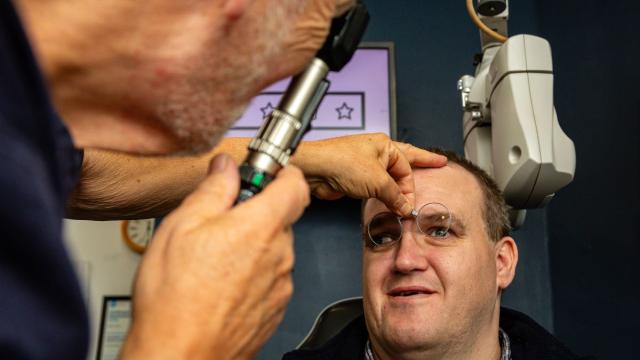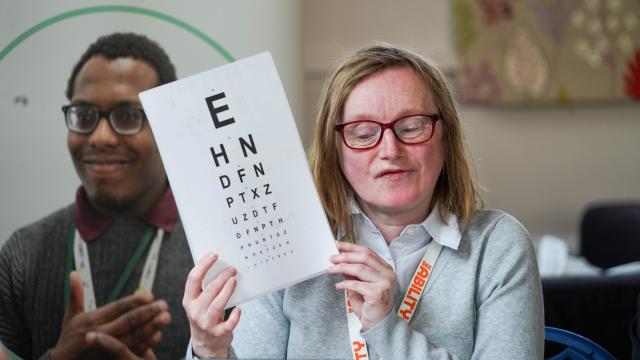
How I champion an equal right to sight - a blog by Joanne Kennedy, SeeAbility Eye Care Champion
My name is Joanne Kennedy and I work for SeeAbility as an Eye Care Champion in the North West. I'll be honest, before I started my job with SeeAbility, I didn't know very much about eye care at all. Even though I used to go for eye tests, I had no idea that people with learning disabilities are 10 times more likely to have sight problems!
Now I work with a team of Eye Care Champions and I understand why eye care is so important to people with learning disabilities and autism… and everyone in fact!
Our teams of Champions in the North West and London help people with learning disabilities or autism to use eye care services. We also advise these services on how to be accessible to people with learning disabilities and autism. We have lots of great advice and easy read information.
I understand from personal experience why eye care is important. A couple of years ago I started getting bad headaches but I didn't know what was causing it. Someone suggested that I go to the opticians and they found that my eyesight had got worse and I needed new glasses. Fortunately, when I got the new glasses my headaches stopped and I felt much better!
I have just been for my latest eye test and got two new pairs of glasses. The eye test was a bit different due to Covid, but I’m glad that I’m really looking after my eyes now! Six in ten people with learning disabilities need glasses. I am one of them and if I don’t wear them for a while, I get headaches.
When I went to a special school as a child, we had ‘eye screening’, which was where they showed us letters and asked us to name them. Luckily I knew my letters so I was able to do this, but lots of the other children didn't recognise letters so they couldn't do this test. I wonder what happened for these children when the testing method wasn't accessible to them? I now know that my eye screening was not a full eye test.
In recent years, SeeAbility has been funded to go into special schools, carry out full eye tests and dispense glasses. This means that the children get their eye test in a safe and familiar environment, from an eye care professional and don't need to take time out of school to go to the opticians or hospital eye clinic. Lots of these children have benefited from their eye test. It also means the special schools can meet their needs better because they understand what each child can see and if they need glasses. Children who can see well are more likely to engage in their lessons and learn more as a result, rather than switching off because they can’t see very well.
This is why I believe that it’s really important to have full eye testing for children in special schools today. It has been brilliant that NHS England has committed to introducing eye tests in all special schools in England. This can’t happen soon enough, and I’m so pleased that there are now children in the North West of England getting this service, as it rolls out gradually across the country to thousands more.
But eye care is just as important for other groups like children with special needs who don’t go to special schools and also adults with learning disabilities.
Once children have shown that they can receive an accessible eye test in a special school, they should be able to expect to receive the same level of eye care throughout their lives.
The best way to meet this need is to commission a special community eye care pathway for people with learning disabilities called the LOCSU pathway. The pathway provides longer or multiple appointments, the use of SeeAbility optometry eye test forms and testing methods tailored to suit that person.
At the moment, this pathway is just available in some areas of the country and so lots of people are missing out which isn't right. At least in my area there is a pathway and it’s been part of my work as a North West Eye Care champion to help encourage people to use it.
Without access to the right eye care, people with learning disabilities and autism won’t be taken seriously when they start to have problems with their eyesight. If people need to get closer than usual to others, it could be seen as an issue with behaviour rather than because someone’s eyesight has changed. We need to understand how much someone can see so that we know what support they need to have a good life.
In my work, I hear of people who thought they just couldn’t go for an eye test or are scared of having one, and people getting glasses for the first time in their lives to help them see properly for the first time. Imagine that!
I met a lady called Donna who was nervous about going for an eye test because of the pandemic. I explained to Donna that the optician would be wearing a mask and there would be lots of safety measures in place. This support gave Donna the confidence to go for her eye test. It all went well and her optician explained all the tests. Donna needed two pairs of glasses, chose them herself and now enjoys reading and watching TV more as she can see more clearly!
At SeeAbility, we will all keep working on these issues to make sure that Donna and everyone with a learning disability or autism is able to have an accessible eye test every two years or more often. We believe that everyone can have an eye test – you don’t need to be able to read or speak - and that eye tests should be made accessible to everyone!
The Big Conversation
SeeAbility’s Big Conversation is all about belonging and what it means to each of us. For me, it’s about feeling included and involved in my community and having meaningful connections with others. I certainly think my work as an Eye Care Champion helps me feel I’m giving back to people and I really enjoy sharing my knowledge and seeing the impact it has.
Join The Big Conversation and find out what it really means to live a good life.





